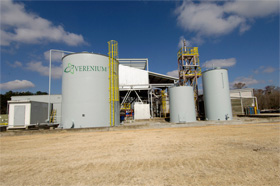A $40,000 grant is helping a Pennsylvania school district go green. The Alternative Fuels Incentive Grant will help the Radnor Township School District purchase nearly 94,000 gallons of B20 biodiesel, as well as helping cover two storage tanks for the green fuel.
The district received praise from Pennsylvania Environmental Protection Secretary Kathleen McGinty through her agency’s press release:
 “Schools, truck drivers, small businesses and families across the commonwealth are feeling the pressure of higher fuel bills on their budgets and wallets,” said McGinty. “Switching from conventional fuels to homegrown biofuels will help break our addiction to foreign oil, bring down costs, strengthen national security, and grow our economy.
“Schools, truck drivers, small businesses and families across the commonwealth are feeling the pressure of higher fuel bills on their budgets and wallets,” said McGinty. “Switching from conventional fuels to homegrown biofuels will help break our addiction to foreign oil, bring down costs, strengthen national security, and grow our economy.
“The Radnor Township School District is leading by example on this front. Rather than sending all of its diesel fuel dollars out of state, it’s making an investment in Pennsylvania.”
The move is also touted for its benefit to the environment and district’s students:
Biodiesel provides significant environmental improvements compared to traditional diesel fuels. Running the district’s diesel-powered vehicles on the renewable fuel will result in the following emissions reductions each year, according to district calculations:
• Particulate matter, linked to asthma and respiratory ailments, 12 percent,
• Unburned hydrocarbons, 20 percent,
• Carbon monoxide, 12 percent,
• Sulfur dioxide, linked to smog and acid rain, 20 percent, and
• Carbon dioxide, the leading greenhouse gas, 16 percent.
Ninety-four thousand gallons of biodiesel might not seem like a lot, but it is a start that one school district was able to make toward a greener future… with just a little help.


 Roe explains that Coskata combines both biological and thermochemical processing and can use a wide variety of feedstocks, from wood chips, weeds and non-food crops like miscanthus, to even human waste and carbon-heavy garbage like tires.
Roe explains that Coskata combines both biological and thermochemical processing and can use a wide variety of feedstocks, from wood chips, weeds and non-food crops like miscanthus, to even human waste and carbon-heavy garbage like tires. Sales of alternative fuel vehicles in the United States, including flex-fuel and hybrid electric, reached 1.8 million last year, about 250,000 more than in 2006.
Sales of alternative fuel vehicles in the United States, including flex-fuel and hybrid electric, reached 1.8 million last year, about 250,000 more than in 2006.
 According to officials, the site has been electronically energized and the turnover of individual systems to start-up and operating teams has begun so that the functional capabilities of each system can be tested. In total, more than forty separate systems will be evaluated over approximately the next three months.
According to officials, the site has been electronically energized and the turnover of individual systems to start-up and operating teams has begun so that the functional capabilities of each system can be tested. In total, more than forty separate systems will be evaluated over approximately the next three months. Spirits were high for driver Ryan Hunter-Reay at the start of the race where he had qualified for sixth pole position. After ten laps behind the pace car in the rain, the field opened up and Hunter-Reay spun out, dropping him down to 23rd.
Spirits were high for driver Ryan Hunter-Reay at the start of the race where he had qualified for sixth pole position. After ten laps behind the pace car in the rain, the field opened up and Hunter-Reay spun out, dropping him down to 23rd.  Drivers Oliver Gavin and Olivier Beretta won their second consecutive class victory on the waterfront street circuit in St. Petersburg, Florida.
Drivers Oliver Gavin and Olivier Beretta won their second consecutive class victory on the waterfront street circuit in St. Petersburg, Florida. 
 That company is
That company is  While finding oil in the hot, dry regions of Texas might not be something new, how one company is going about it certainly is.
While finding oil in the hot, dry regions of Texas might not be something new, how one company is going about it certainly is. But instead of ponds, Valcent uses a closed, vertical system, growing the algae in long rows of moving plastic bags. The patented system is called Vertigro, a joint venture with Canadian alternative energy company Global Green Solutions. The companies have invested about $5 million in the Texas facility.
But instead of ponds, Valcent uses a closed, vertical system, growing the algae in long rows of moving plastic bags. The patented system is called Vertigro, a joint venture with Canadian alternative energy company Global Green Solutions. The companies have invested about $5 million in the Texas facility.